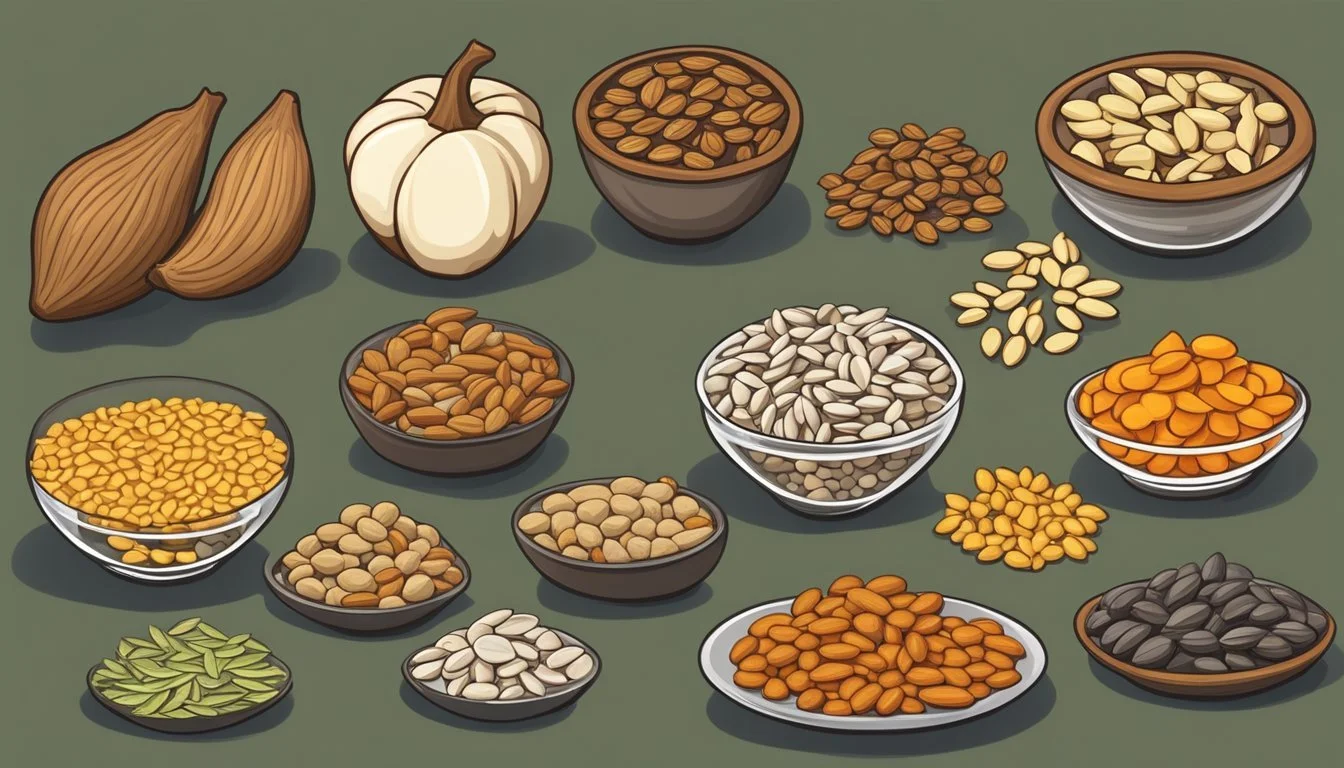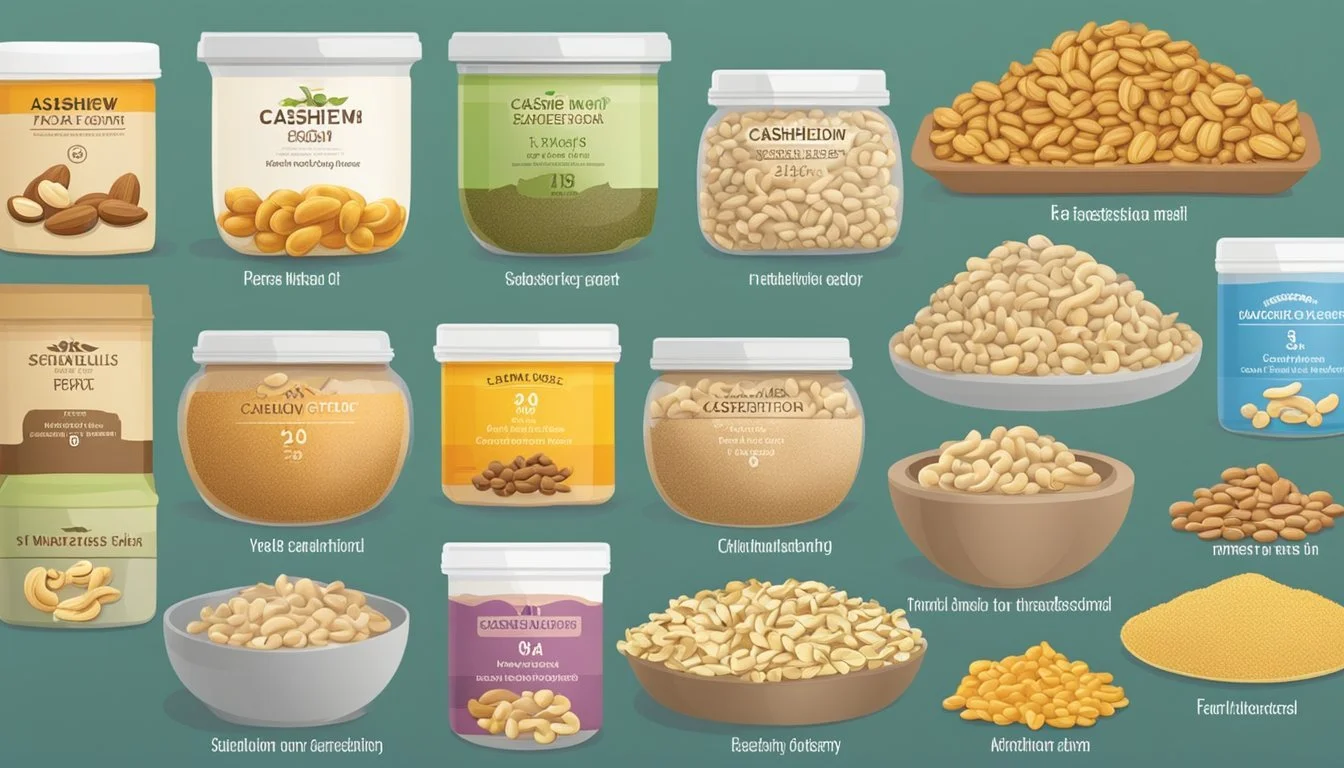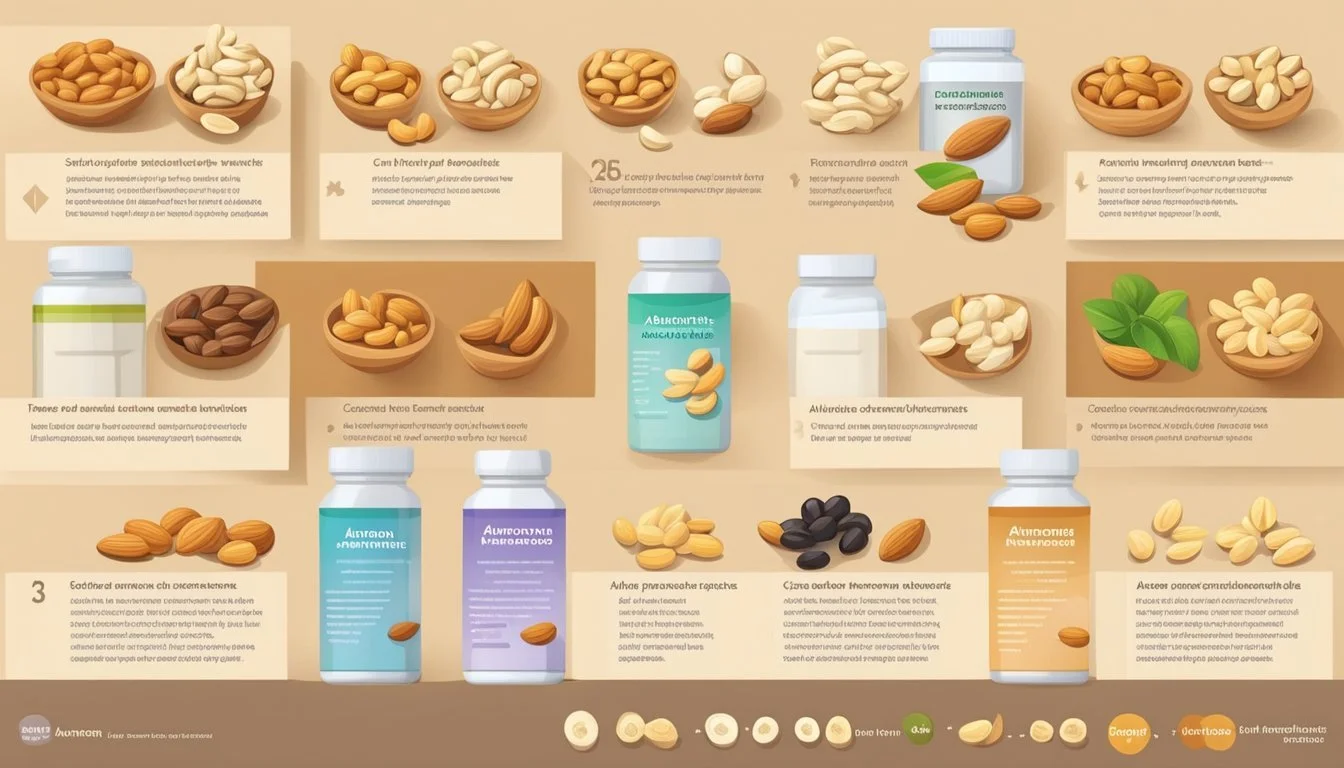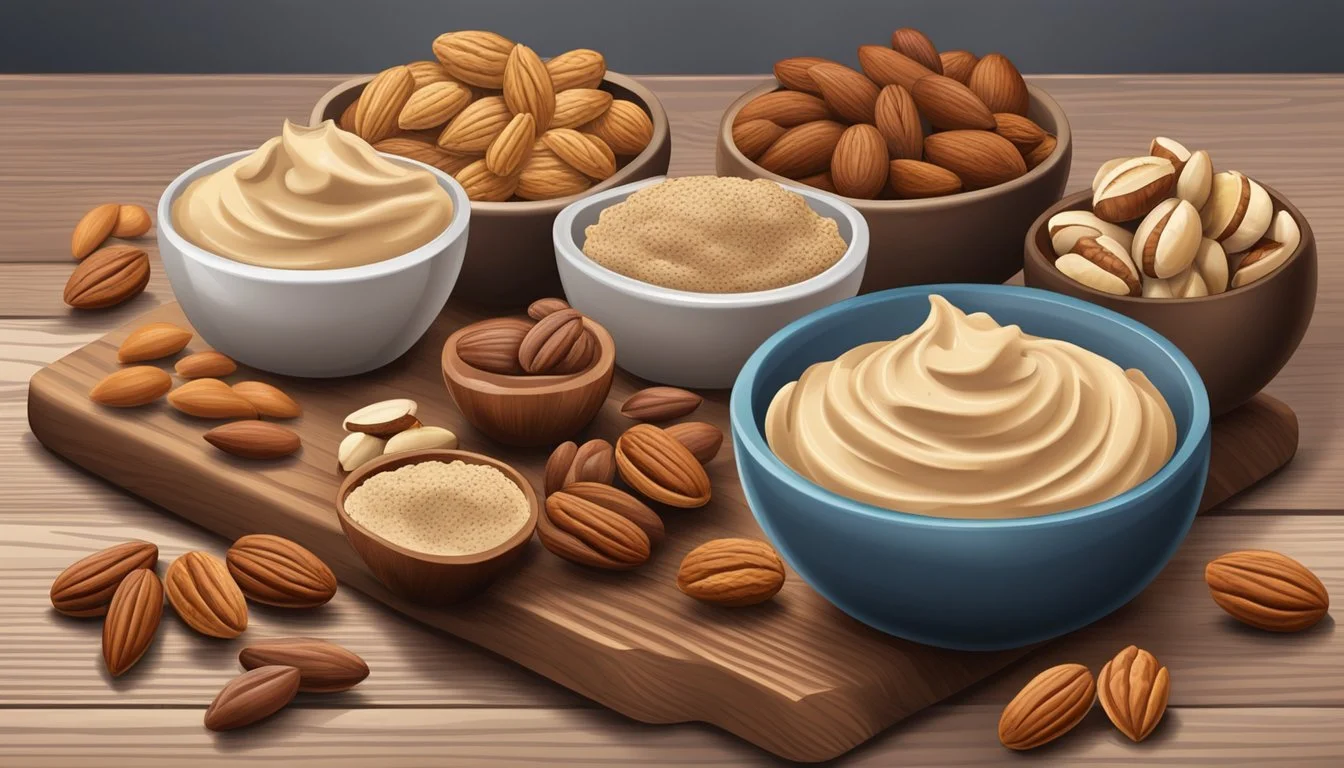Cashew Substitutes
Top Alternatives for Allergy-Friendly Cooking
Cashews have long been a favorite for their creamy texture and rich flavor, making them a staple in various recipes, from sweet treats to savory sauces. However, due to reasons such as allergies, dietary preferences, or simply the need for variety, individuals often seek suitable cashew substitutes that can replicate the characteristics of this beloved nut without compromising the quality of the dish.
Several nuts and seeds offer similar textures and flavors that make them excellent alternatives to cashews. Almonds, for instance, can mimic the creaminess of cashews when soaked and blended, serving well in sauces, butters, and dairy-free milk preparations. Macadamia nuts, with their buttery taste, also stand in quite effectively in recipes that require the unique taste and consistency of cashews.
For those with nut allergies or looking for a lower-fat option, seeds like sunflower or pumpkin seeds can be an acceptable replacement, especially in dishes that require a crunchy texture. These substitutes ensure that the essence of the recipes is maintained, while also catering to various dietary needs and preferences.
Understanding Nut Allergies and Cashew Substitutes
The following section provides detailed information regarding nut allergies, specifically to cashews, and an array of substitute options for those with such allergies or dietary preferences.
Identifying Nut Allergies
Nut allergies, including those to cashews, manifest with symptoms such as abdominal pain, vomiting, and respiratory difficulties. An allergy to cashews might also imply sensitivity to other tree nuts; thus, accurate identification through medical testing is crucial for safe dietary choices.
Best Nut-Free Options
Nut-free substitutes for cashews are often essential for individuals with nut allergies. Noteworthy alternatives include:
Seeds: Sunflower and pumpkin seeds can mimic cashew's texture and nutty flavor.
Legumes: Chickpeas or cannellini beans, pureed, offer a protein-rich substitute in savory dishes.
Dairy Products: For creamy textures, dairy options like cream cheese can replace cashew-based sauces in recipes not requiring vegan ingredients.
Utilizing Seeds and Legumes
Seeds and legumes stand out as nut-free options rich in protein and fiber. Sunflower seeds or tahini (sesame seed paste) can replace cashews in pesto or dressings, while silken tofu offers a creamy texture ideal for desserts or smoothies. Pumpkin seeds also serve as a crunchy cashew alternative in salads and baking.
Dairy-Free Alternatives
For those seeking dairy-free cashew substitutes, several choices include:
Soy milk and almond milk: Replace cashew milk in recipes.
Coconut cream: Can mimic cashew cream's richness in soups and desserts.
Vegan sour cream: Made from tofu or cashews, provides the tangy flavor of sour cream without the dairy.
Exploring Other Nut Options
If one doesn't have allergies to other nuts, various tree nuts like almonds, macadamia nuts, and pistachios can substitute for cashews. Each offers distinct flavors and textures:
Almonds: Blend well for milks and butters.
Macadamia nuts: Provide a creamy consistency suitable for desserts.
Pecans, walnuts, hazelnuts: Good for texture and taste in baked goods and savory dishes.
Nutritional Considerations for Substitutes
When selecting a substitute for cashew butter, it's crucial to consider how the replacement aligns with nutritional goals such as protein and fat content, vitamin and mineral profiles, as well as dietary fiber contributions. For individuals with nut allergies or those following special diets, understanding the allergenic potential and diet compatibility of alternatives is equally important.
Protein Content and Healthy Fats
Substitutes for cashew butter offer varying levels of protein and healthy fats. Options like sunflower seeds and almonds are high in protein, which is essential for muscle repair and growth. Almonds, in particular, are also rich in monounsaturated fats and can be transformed into almond butter or milk.
Omega-3 Fatty Acids: Flaxseeds and walnuts are excellent for boosting intake of omega-3, which supports heart health and reduces inflammation.
Vitamins and Minerals Profile
Each cashew substitute has a unique vitamin and mineral composition that can affect overall nutrition.
Vitamin E: Sunflower seeds are a standout for vitamin E, a powerful antioxidant.
Magnesium: Both almonds and sunflower seeds provide substantial magnesium, beneficial for bone health and metabolic function.
Minerals such as iron, selenium, zinc, copper, and potassium are present in variable amounts across different substitutes, offering benefits ranging from immune support to nerve function.
Fiber and Heart Health
Dietary fiber found in nut substitutes like almonds and seeds contributes to digestive health and can assist in maintaining healthy blood cholesterol levels, impacting heart health.
Almonds: High in soluble fiber, which can help to manage blood pressure and cholesterol levels.
Allergen Awareness and Sensitivities
Awareness of potential allergens in substitutes is key, especially for replacing cashew butter in the diet of someone with nut allergies. Sunflower seeds are often a safe alternative, while almond products should be avoided by those with tree nut allergies.
Special Diets Compatibility
Many cashew butter substitutes fit well into vegan, plant-based cooking, and dairy-free diets.
Vegan and Plant-Based: Sunflower seeds and flaxseeds are completely animal-free and offer dense nutrition.
Dairy-Free: Almond milk is a popular dairy-free liquid substitute in various recipes.
Culinary Uses and Cashew Substitutes
Cashew nuts are known for their creamy texture and mild, sweet flavor. This section explores various cashew alternatives suitable for different culinary applications, each offering a comparable taste profile or fulfilling a similar function in recipes.
Replacing Cashews in Creamy Sauces
Creamy cashew-based sauces can be replicated using blanched almonds or macadamia nuts, which, when soaked and blended, produce a similar consistency. For a non-nut option, silken tofu blended with nutritional yeast can mimic the creaminess while being allergy-friendly.
Alternatives for Cashew Butter
In spreads and dips, almond butter and peanut butter are ideal substitutes for cashew butter due to their akin consistencies and complementary flavors. For those with nut allergies, sunflower seed butter, which boasts a comparably buttery and nutty taste, serves as a safe alternative.
Substitutes in Baking and Cooking
In baking, where cashews are often used for their fat content and texture, almond flour can replace ground cashews to yield a similar end product. Sunflower seeds provide a crunchy texture in granola and trail mix, while sesame seed butter imparts a creamy quality to various dishes.
Salads and Garnishing Alternatives
For salads, cashew pieces can be substituted with chopped peanuts, sliced almonds, or roasted sunflower seeds for crunch. Dressings that traditionally use cashew cream can be made using almond milk or coconut cream to preserve the desired smoothness.
Making Dairy-Free Cheese Substitutes
Vegan cheese products often rely on cashews for their creamy base. Alternatives include a mixture of almond milk and nutritional yeast for flavor, while puréed pumpkin seeds can provide the required texture and bonding properties.
Pasta and Rice Sauce Enhancements
Cashew cream in pasta and rice sauces can be replaced by coconut cream, retaining the richness without altering the flavor profile significantly. Caramelized onions and garlic add depth and savoriness, compensating for the absence of nuttiness that cashews typically provide.
Economic and Practical Considerations
In exploring cashew substitutes, it's crucial to consider not only the culinary aspects but also the economic and practical ones. These include price, shelf life, and local availability, which can affect both the choice and use of alternative nuts or seeds.
Price Comparison and Value
Cashew substitutes vary in price, and the most cost-effective choice often depends on the region and market conditions. For example:
Almonds: Often less expensive than cashews, they provide a similar nutrient profile and versatility in recipes.
Macadamia Nuts: Typically more costly than cashews, but they offer a rich texture and flavor that may justify the expense in certain dishes.
Comparison of average prices per pound (as of latest available data):
Substitute Average Price Almonds $5 - $9 Macadamia $15 - $25
Shelf Life and Storage
Shelf life and storage conditions play a significant role in the economy of using cashew substitutes. Most nuts have a comparable shelf life if stored properly — in a cool, dry place and ideally in an airtight container to prevent spoilage and rancidity. Notably, cashew substitutes like almonds have a slightly longer shelf life due to their lower oil content.
Local Availability and Seasonal Variations
The availability of cashew substitutes can fluctuate based on local agricultural conditions and seasonality. For instance, almonds are grown extensively in California and are generally available year-round, whereas macadamia nuts are more seasonal and predominantly grown in Hawaii and other tropical regions. Consumers may find that certain substitutes are more readily available and thus more economically viable at different times of the year.
It's also important to note that local markets play a role in what substitutes are on offer, with some regions favoring particular varieties due to climate suitability and consumer demand.
Consumer Insights and Reviews
The following section provides distinct insights based on user reviews and preferences, outlining how various cashew substitutes are viewed in terms of taste and utility in addressing dietary needs.
Personal Preferences and Reviews
Users who substitute cashews often cite almonds and macadamia nuts as top choices due to their texture and flavor. Reviews suggest that when ground, these nuts can mimic the creaminess of cashews, making them highly favored in recipes such as vegan cheese and sauces. Personal taste varies, but a common thread among reviews is the importance of a substitute's ability to provide a similar richness and mouthfeel to that of cashews.
Almonds: They are often soaked and processed to create products like almond butter or almond milk. Reviews highlight the versatility of almonds, not only in dairy-free products but also as a direct cashew replacement in recipes.
Macadamia Nuts: Known for their buttery flavor, macadamia nuts receive positive feedback for their use in desserts and savory dishes alike. Reviewers often note their rich texture, which closely resembles the indulgent quality of cashews.
Dietary Restrictions and Recommendations
The selection of a cashew alternative is frequently dictated by dietary restrictions such as nut allergies or vegan choices. Consumers with cashew allergies often opt for seeds like sunflower or pumpkin seeds as safer alternatives. These substitutes receive favorable reviews for their nutritional benefits and lower risk of allergic reactions.
For those following a vegan diet, coconut cream and silken tofu are frequently recommended as dairy-free and nut-free cashew alternatives. Reviews often praise coconut cream for its thick consistency and ability to add creaminess to vegan dishes without the nuts. Silken tofu is similarly commended for its versatility and texture, which users find to be an excellent base for vegan cheese and sauces.
Coconut Cream: Exceptionally popular in vegan circles for its thick, creamy texture that closely mirrors that of cashew cream.
Silken Tofu: Appreciated for its neutral flavor, allowing it to easily absorb seasonings, making it a versatile substitute in various culinary applications.
By considering individual taste preferences and dietary needs, consumers are able to effectively incorporate suitable alternatives into their cooking, finding satisfaction in both flavor and texture.
Summary and Final Thoughts
When considering cashew substitutes, consumers are presented with a variety of options that cater to different needs, whether due to allergies, dietary preferences, or simply a lack of cashews on hand. Choices in substitute ingredients can affect the taste, texture, and nutritional profile of the final dish, so it's essential for individuals to select alternatives that best align with their specific culinary goals.
Almonds are frequently touted as a prime alternative, given their similar characteristics and the ability to be processed into butter or milk. Macadamia nuts are praised for their creamy texture and rich flavor, closely mimicking cashews, especially when blended. Soy nut butter and tahini offer unique flavors, with the former providing a similar consistency and the latter a distinctive nutty taste with a hint of bitterness.
Recipe Adaptations Using Substitutes:
Almonds: A direct stand-in for cashews in sauces, butters, and vegan cheeses.
Macadamia Nuts: Blend with water to replace cashews in creamy sauces.
Soy Nut Butter/Tahini: Use in a 1:1 ratio for cashew butter, considering flavor differences.
It's crucial for individuals to adjust blending techniques and ratios to maintain the desired consistency and flavor profile. Recipes may call for substitutions to be implemented carefully, either fully or partially, depending on the outcome one wishes to achieve.
In summary, each suggested substitute offers unique qualities that must be appreciated and considered. When substituting for cashews, one thoroughly assesses each alternative's suitability for the intended recipe to ensure culinary success.
Appendix
This section provides references used in the compilation of this article, as well as acknowledgments to contributors and experts in the field of culinary alternatives.
References and Additional Resources
Primary Sources:
Happy Muncher: "The 10 Best Substitutes for Cashews"
Foodie Pair: "Our 10 Best Substitutes for Cashews"
girlmeetsfood.com: "What's The Best Cashew Substitute? 10 Nutty Ideas"
Liv Vegan Strong: "Cashew Alternatives for EVERY Occasion"
Pantry & Larder: "BEST Cashew Butter Substitutes + 5 To Avoid"
All sources provide insights on alternative options to cashews in various recipes, emphasizing almonds, macadamia nuts, soy nut butter, and tahini as possible substitutes.
Additional Reading: For further information on nut substitutes and their uses in cooking and baking, readers may consult culinary textbooks, nut allergen forums, and vegetarian and vegan dietary guides.
Acknowledgements
The information with regard to cashew substitutes has been gathered and synthesized with the help of culinary experts and nutritionists. They have provided insights into the nutritional profiles and culinary applications of various substitute nuts and seeds. Their experience in the industry is invaluable, and their contributions to the field have made the formulation of this article possible.







